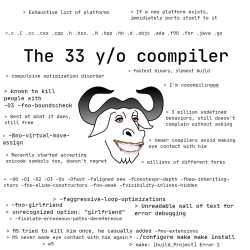>>92611490>variables mixed with code or declared in a for loop's parentheses, // comments, and booleans.All of these are unironically bloat.
Mixing variable declarations with statements was added purely because of inertia from C++, where such a feature is required: declaring a variable always invokes a constructor, which can do anything. Not being able to call this constructor anywhere in the program, potentially after some statements, would make C++ already more unusable than it already is.
In C, however, a mere variable declaration does nothing: it only reserves space for it in the respective function's stack frame, and stack allocation can be done very efficiently with a single instruction, increasing the stack pointer by a statically known amount. In a way, a variable declaration without an initializer is effectively not "code" at all, since it generates no instructions.
Declaring variables anywhere is merely syntactic sugar and by definition equivalent to declaring them at the top of the current scope. And if you *do* want to "limit the variable's visibility", you can always just open a new block, even in C89. Hence, mixing variable declarations with other statements is just bloat, it adds no real power to the language.
An additional comment syntax is worthless, C already had its own /* */ style comments. Before you worry about them not being able to be nested or easily typed on a single line, consider that even decade-old editors can insert comments automatically with a single command, regardless of language. Get better tools.
Finally, boolean types are worthless since the core semantics of the language aren't changed: "truth" is still defined in terms of arithmetic values: a scalar value equal to 0 is logically valse, while every other value is true. Besides, C99 doesn't actually define a new built-in boolean type, only C23 does. stdbool.h merely includes typedefs or #defines, depending on the implementation.

